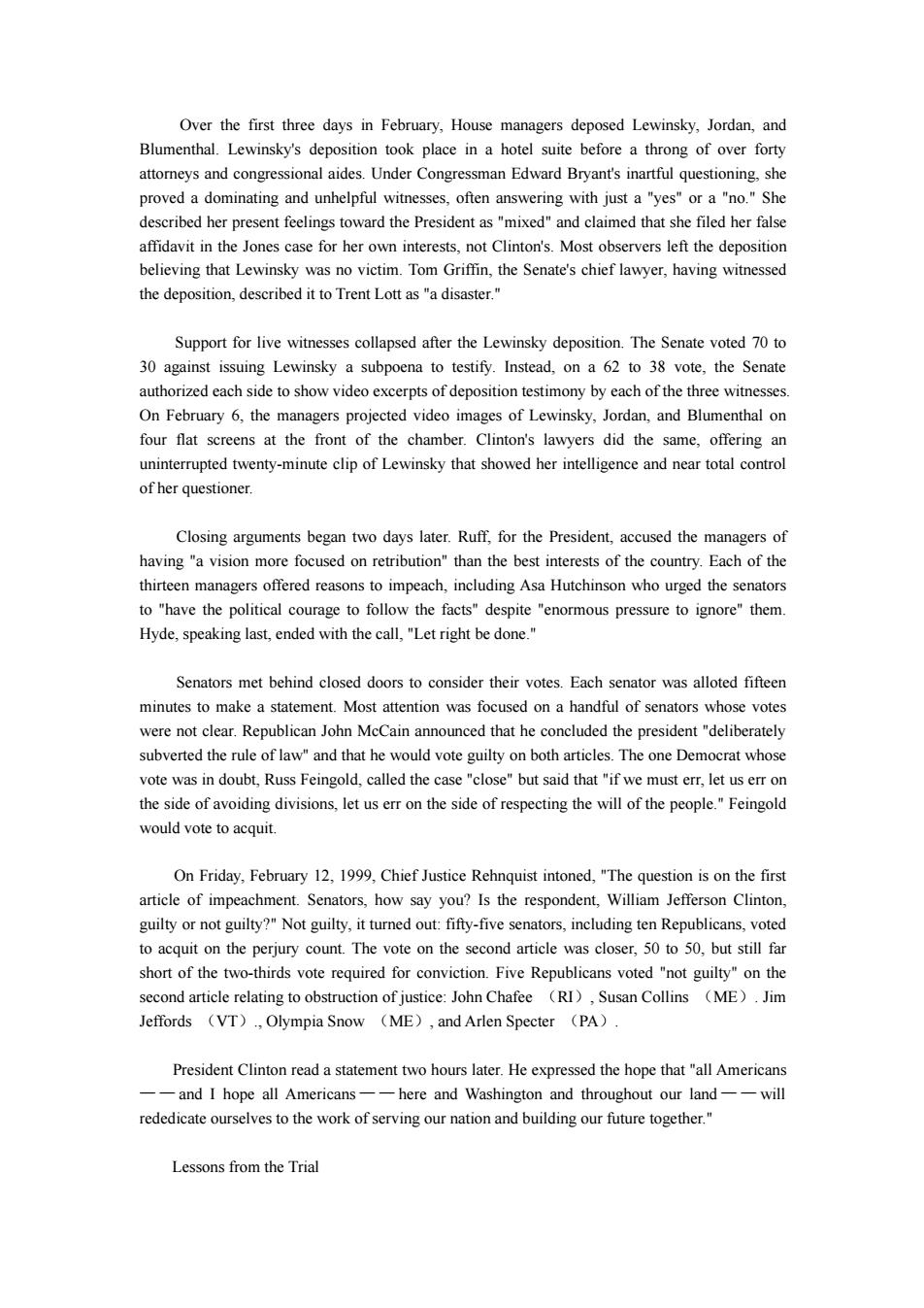正在加载图片...

Over the first three days in February,House managers deposed Lewinsky,Jordan,and Blumenthal.Lewinsky's deposition took place in a hotel suite before a throng of over forty attorneys and congressional aides.Under Congressman Edward Bryant's inartful questioning,she proved a dominating and unhelpful witnesses,often answering with just a "yes"or a "no."She described her present feelings toward the President as "mixed"and claimed that she filed her false affidavit in the Jones case for her own interests,not Clinton's.Most observers left the deposition believing that Lewinsky was no victim.Tom Griffin,the Senate's chief lawyer,having witnessed the deposition,described it to Trent Lott as "a disaster." Support for live witnesses collapsed after the Lewinsky deposition.The Senate voted 70 to 30 against issuing Lewinsky a subpoena to testify.Instead,on a 62 to 38 vote,the Senate authorized each side to show video excerpts of deposition testimony by each of the three witnesses. On February 6,the managers projected video images of Lewinsky,Jordan,and Blumenthal on four flat screens at the front of the chamber.Clinton's lawyers did the same,offering an uninterrupted twenty-minute clip of Lewinsky that showed her intelligence and near total control of her questioner. Closing arguments began two days later.Ruff,for the President,accused the managers of having "a vision more focused on retribution"than the best interests of the country.Each of the thirteen managers offered reasons to impeach,including Asa Hutchinson who urged the senators to "have the political courage to follow the facts"despite "enormous pressure to ignore"them. Hyde,speaking last,ended with the call,"Let right be done." Senators met behind closed doors to consider their votes.Each senator was alloted fifteen minutes to make a statement.Most attention was focused on a handful of senators whose votes were not clear.Republican John McCain announced that he concluded the president "deliberately subverted the rule of law"and that he would vote guilty on both articles.The one Democrat whose vote was in doubt,Russ Feingold,called the case "close"but said that "if we must err,let us err on the side of avoiding divisions,let us err on the side of respecting the will of the people."Feingold would vote to acquit. On Friday,February 12,1999,Chief Justice Rehnquist intoned,"The question is on the first article of impeachment.Senators,how say you?Is the respondent,William Jefferson Clinton, guilty or not guilty?"Not guilty,it turned out:fifty-five senators,including ten Republicans,voted to acquit on the perjury count.The vote on the second article was closer,50 to 50,but still far short of the two-thirds vote required for conviction.Five Republicans voted "not guilty"on the second article relating to obstruction of justice:John Chafee (RI),Susan Collins (ME).Jim Jeffords (VT).,Olympia Snow (ME),and Arlen Specter (PA). President Clinton read a statement two hours later.He expressed the hope that"all Americans --and I hope all Americans--here and Washington and throughout our land--will rededicate ourselves to the work of serving our nation and building our future together." Lessons from the TrialOver the first three days in February, House managers deposed Lewinsky, Jordan, and Blumenthal. Lewinsky's deposition took place in a hotel suite before a throng of over forty attorneys and congressional aides. Under Congressman Edward Bryant's inartful questioning, she proved a dominating and unhelpful witnesses, often answering with just a "yes" or a "no." She described her present feelings toward the President as "mixed" and claimed that she filed her false affidavit in the Jones case for her own interests, not Clinton's. Most observers left the deposition believing that Lewinsky was no victim. Tom Griffin, the Senate's chief lawyer, having witnessed the deposition, described it to Trent Lott as "a disaster." Support for live witnesses collapsed after the Lewinsky deposition. The Senate voted 70 to 30 against issuing Lewinsky a subpoena to testify. Instead, on a 62 to 38 vote, the Senate authorized each side to show video excerpts of deposition testimony by each of the three witnesses. On February 6, the managers projected video images of Lewinsky, Jordan, and Blumenthal on four flat screens at the front of the chamber. Clinton's lawyers did the same, offering an uninterrupted twenty-minute clip of Lewinsky that showed her intelligence and near total control of her questioner. Closing arguments began two days later. Ruff, for the President, accused the managers of having "a vision more focused on retribution" than the best interests of the country. Each of the thirteen managers offered reasons to impeach, including Asa Hutchinson who urged the senators to "have the political courage to follow the facts" despite "enormous pressure to ignore" them. Hyde, speaking last, ended with the call, "Let right be done." Senators met behind closed doors to consider their votes. Each senator was alloted fifteen minutes to make a statement. Most attention was focused on a handful of senators whose votes were not clear. Republican John McCain announced that he concluded the president "deliberately subverted the rule of law" and that he would vote guilty on both articles. The one Democrat whose vote was in doubt, Russ Feingold, called the case "close" but said that "if we must err, let us err on the side of avoiding divisions, let us err on the side of respecting the will of the people." Feingold would vote to acquit. On Friday, February 12, 1999, Chief Justice Rehnquist intoned, "The question is on the first article of impeachment. Senators, how say you? Is the respondent, William Jefferson Clinton, guilty or not guilty?" Not guilty, it turned out: fifty-five senators, including ten Republicans, voted to acquit on the perjury count. The vote on the second article was closer, 50 to 50, but still far short of the two-thirds vote required for conviction. Five Republicans voted "not guilty" on the second article relating to obstruction of justice: John Chafee (RI), Susan Collins (ME). Jim Jeffords (VT)., Olympia Snow (ME), and Arlen Specter (PA). President Clinton read a statement two hours later. He expressed the hope that "all Americans — — and I hope all Americans — — here and Washington and throughout our land — — will rededicate ourselves to the work of serving our nation and building our future together." Lessons from the Trial